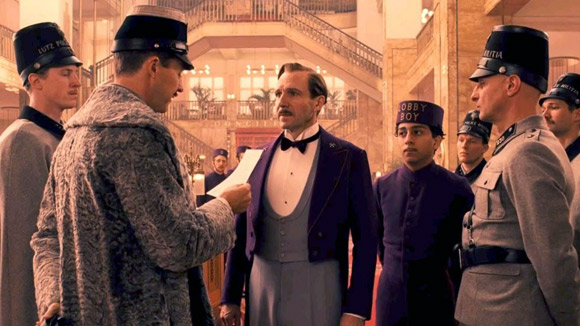Jose here. Last week I attended a screening of The Grand Budapest Hotel followed by a Q&A with director Wes Anderson. Self-aware and adorably humorous he shared anecdotes about the making of the film, and also discussed his influences. Here are some of the most interesting tidbits.
Photo credit: Jose Solis
On the film’s conception.
I had this thought to do something that was based on Stefan Zweig, but really the biggest thing was always sort of the Lubitsch movies and the 30s, the Hollywood movies set in grand hotels...Burbank, Poland.
On Stefan Zweig.
Zweig drew me into wanting to tell a story in this setting, I was also trying to mimic some of his devices, in fact mimic is too weak a word, I think plagiarism is more accurate. The opening thing where there’s an author, he’s reciting, paraphrasing something from one of Zweig’s books. Meeting a character who meets a character who’s going to tell him the story, Zweig uses that in all his big works.
Zweig has this great memoir about the world of yesterday, which was about the way he thought of Vienna before the war. I was interested in many elements from that story, so we took two wars and made them into one big war, and mixed together some decades. We made our own war, we made our own country, which is fun to do. In fact the hotel in the movie is really a dozen hotels mixed together, it’s the greatest hits of grand hotels in Central Europe.
On Hitchcock.
There’s a scene with Jeff Goldblum where Willem Dafoe is chasing him through a museum, I think if we go shot by shot, the nice way to say it would be that it’s an “homage” to Hitchcock.

On Ralph Fiennes.
Ralph is not necessarily somebody who people automatically think of for a comedy, I’d seen him in a play in London, in God of Carnage and he was very funny, and he’s very funny in In Bruges, although he’s also very scary in it. Even in Schindler’s List, I watched that movie again recently and he has some very funny moments playing this monster, so he was somebody I wanted to work with for years and years. He wants to really feel like the character every moment he’s on set, and if he’s unhappy he will let you know. I had this idea he’s like an Olivier, but he’s not, he’s a Method actor. I had never worked with someone like that before, there’s always this charge on the set...I’d worked with people like this before but with Ralph it was always a positive charge.
On whether people get his movies or not.
Over the years I’ve watched my movies less and less with an audience. What I learn usually from showing to people is whether I’m being clear or not. Are we achieving what we set out to do? Now I do that by bringing people into the cutting room but we used to do full test screenings and it was horrible! The first one I did, Bottle Rocket, was the most horrific one. We had 380 people at the beginning and we lost 200 throughout the screening and I saw them go! I wondered if they were going out to get popcorn why were they taking everything with them.
On M. Gustave’s use of expletives.
M. Gustave is largely based on a real person, he’s not a hotel concierge, but he says he would be the greatest hotel concierge, and he talks a bit like that, sometimes he would use particularly shocking language with the more genteel kind of person just to jolt them, so they won’t forget him. That’s just how the real guy talks.
On working with Alexandre Desplat.
We work very closely together, we live in the same neighborhood in Paris. When we start the process I’m always ready to get started on the next phase and I have a lot of fun with him. He’s one of my favorite movie composers, he likes to play, and with this one we got a balalaika orchestra from Moscow and Paris, he can take whatever you throw at him and turn it into his own thing.
On Amarcord, Fellini and his use of nostalgia in The Grand Budapest Hotel.
Maybe that’s my favorite Fellini movie, and that movie has such a different rhythm to this one, but it also has so many things in common, but there are many things we’ve drawn on from that movie, for instance the way the Grand Hotel in Amarcord is represented in an even more theatrical way than ours is, or his ship, I don’t think anyone else could get away with it the way Fellini could. I always think about Fellini in terms of the characters, he makes deep characters that are sort of cartoons, and somehow he finds that balance and sometimes I’m trying for something like that with some of mine. That’s another reason why I loved working with Ralph, I just knew he would make M. Gustave a real guy.
On which of his characters he would like to revisit.
I think maybe the one I would explore that with is Max Fisher. With Jason Schwartzman, sometimes you cast these kids and then they go to school, but Jason I met when he was 16 and we have worked together ever since, I’ve seen his whole talent and variety of art works expanding, so just to continue that collaboration is reason enough to consider something like that.